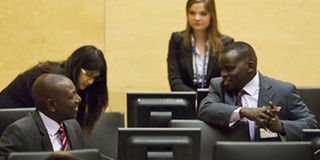ICC and the remaking of Kenya: A nation starts on a strange journey

Kenya's Deputy President William Ruto (L) speaks with broadcaster Joshua Arap Sang (R) in the courtroom before their trial at the International Criminal Court (ICC) in The Hague on September 10, 2013. FILE | NATION MEDIA GROUP
What you need to know:
- My sense is, if any mafia took power in the Kibaki era, it was the Makerere University and Dar es Salaam mafia. Kibaki himself was a Makererean, so was Vice-President Moody Awori, Cabinet Secretary Francis Muthaura, Planning Minister Anyang’ Nyong’o, Trade Minister Mukhisa Kituyi, and so on.
- When the ICC charges came along, they turbo-charged Kenya’s embrace of Africa.
- One of the most controversial regional issues of the 1970s was Kenya’s decision to grant the Israeli mission that staged the dramatic Entebbe hostage raid in July 1976 permission to refuel.
So the trial of the “Ocampo Three” — President Kenyatta, Deputy President William Ruto and radio journalist Joshua Sang has started at the International Criminal Court at The Hague.
The three are accused of being complicit in the early 2008 post-election violence that followed the disputed December election.
There has been a lot of discussion on how the trials and their outcomes could affect Kenya in days to come.
I find that interesting, because the most far-reaching impact of the ICC has already happened. Let me explain: To make sense of it, we need to go back to the election of Mwai Kibaki as President at the end of December 2002.
While it was popular to refer to the rise of a “Mt Kenya Mafia” during Kibaki’s rule, it was a cultural and ethnic stereotype. It didn’t tell us about the ideological and philosophical innards of the Kibaki government.
My sense is, if any mafia took power in the Kibaki era, it was the Makerere University and Dar es Salaam mafia. Kibaki himself was a Makererean, so was Vice-President Moody Awori, Cabinet Secretary Francis Muthaura, Planning Minister Anyang’ Nyong’o, Trade Minister Mukhisa Kituyi, and so on.
From Dar es Salaam, we had Mutula Kilonzo, who came in as Justice Minister. In one last act, this Eastern Africa mafia made Willy Mutunga, a Dar University alumnus, Chief Justice.
Kibaki and a couple of his ministers were emotionally and doctrinally East African in ways past governments weren’t. Thus if Kibaki hadn’t pushed hard, Rwanda wouldn’t have been admitted into the East African Community.
During Kibaki’s presidency, we saw the beginnings of a significant shift away from Kenya’s very pro-Western posture, towards East Africa and the East. When the ICC charges came along, they turbo-charged Kenya’s embrace of Africa.
Because from 2010 most African countries individually had taken an anti-ICC line, and then in 2011 the African Union formally voted not to cooperate with it, Kenyatta and Ruto came into office when anti-Hague sentiment was already high in official Africa. Africa was also being touted as the “rising” continent economically, so leaders are asserting their independence more.
To succeed in their diplomatic and psychological war against the ICC, all they had to do was embed Kenyan geopolitics deeper in Africa’s. And that they did.
In his first four months in office, Kenyatta visited more African countries than Kibaki did in the whole of his first term. In that period, Ruto too visited more African nations than Awori did in the four years he was Kibaki’s Vice-President.
Kenyatta is old Kenyan money. And old Kenyan money was traditionally scornful of pan-Africanist politics. It did not support liberation movements; it played golf at Muthaiga and Karen clubs, its children studied in Europe and the USA, and its most important relationship was with the West.
When in the radical 1970s no African could dare have diplomatic relations with Israel, Kenya did. John Githongo calls this “Kenyan exceptionalism”. What Uhuru’s ICC case has done is that it has also turned that old Kenyan money sympathetic to him into an anti-Western constituency; at least in rhetoric.
One of the most controversial regional issues of the 1970s was Kenya’s decision to grant the Israeli mission that staged the dramatic Entebbe hostage raid in July 1976 permission to refuel.
The Kenya of today would not do it.
Then, it used to be that Kenyan progressives were the most pan-African elements in the country. They were critical of the West, first because they viewed it as “imperialist”. It supported reactionary governments in Africa, and pushed unpopular World Bank and IMF structural adjustment policies.
Now there has been a reversal of roles. Because Kenyan progressives generally support the ICC trials, they are at odds with an Africa that wants nothing to do with it. In the process, they have been pushed closer to an old foe, the West.
These kinds of changes usually take a generation. In Kenya they have taken less than five years. In about three short years, the ICC did what the liberation waves on the continent failed to do in nearly 30 years. It finally made Kenya an African country.
[email protected] &twitter:cobbo3





